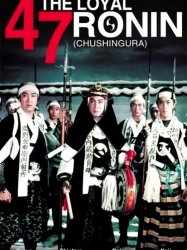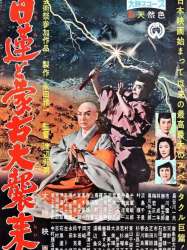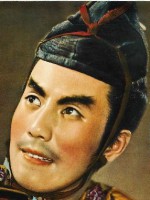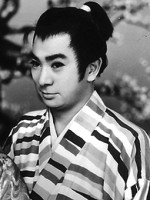The Magnificent Five is a film of genre Drama with Kazuo Hasegawa
The Magnificent Five (1958)
Comments
Leave comment :
Suggestions of similar film to The Magnificent Five
There are 119 films with the same actors, 61419 with the same cinematographic genres, to have finally 70 suggestions of similar films.If you liked The Magnificent Five, you will probably like those similar films :

The Loyal 47 Ronin (1958)
, 2h46Directed by Kunio Watanabe
Origin Japon
Genres Drama, Historical
Themes Seafaring films, Sports films, Transport films, Martial arts films, Samurai films
Actors Kazuo Hasegawa, Shintarō Katsu, Ichikawa Raizō VIII, Kōji Tsuruta, Machiko Kyō, Fujiko Yamamoto
Rating71%





Ce film raconte l'histoire vraie d'un groupe de samouraïs qui sont devenus rōnin (samouraïs sans chef) après que leur daimyō (seigneur féodal) Asano Naganori ait été contraint de commettre un seppuku (suicide rituel) pour avoir agressé un fonctionnaire de la cour, Kira Yoshinaka, qui l'avait insulté. Après avoir soigneusement préparé leur plan pendant plus d'un an, ils exécutent un assaut audacieux sur le domaine de leur ennemi juré et exigent leur vengeance, sachant qu'ils seraient eux-mêmes forcés de partager le sort de leur Seigneur pour expier leur crime.

An Actor's Revenge (1963)
, 1h53Directed by Kon Ichikawa
Origin Japon
Genres Drama
Themes Films about television
Actors Kazuo Hasegawa, Ayako Wakao, Fujiko Yamamoto, Ichikawa Raizō VIII, Shintarō Katsu, Eiji Funakoshi
Rating72%





Three men, Sansai Dobe (Ganjirō Nakamura), Kawaguchiya (Saburō Date) and Hiromiya (Eijirō Yanagi) are responsible for the deaths of seven-year-old Yukitarō’s mother and father. Yukitarō is adopted and brought up by Kikunojō Nakamura (Chūsha Ichikawa), the actor-manager of an Osaka kabuki troupe. The adult Yukitarō (Kazuo Hasegawa) becomes an onnagata, a male actor who plays female roles. He takes the stage name Yukinojō. Like many of the great onnagata, particularly of the seventeenth and eighteenth centuries, he wears women’s clothes and uses the language and mannerisms of a woman offstage as well as on. Many years later, the troupe pays a visit to Edo, where the three men responsible for his parents’ deaths now live. Yukinojō brings about their deaths by means of various stratagems, then, apparently overcome by what he has done, retires from the stage and disappears, no-one knows where. The events of the film are coolly observed and sardonically commented on by the Robin-Hood-like thief Yamitarō, also played by Hasegawa.

Yataro’s Travel Hat (1957)
, 1h34Directed by Kazuo Mori
Genres Drama, Action
Actors Ichikawa Raizō VIII, Michiyo Kogure, Saburo Date, Eijirō Yanagi
 , 1h23
, 1h23Genres Drama, Action
Themes Seafaring films, Sports films, Transport films, Martial arts films
Actors Ichikawa Raizō VIII, Shintarō Katsu, Yatarō Kurokawa, Ryosuke Kagawa, Ken Mitsuda, Saburo Date
Rating62%






Sisters of Gion (1956)
, 1h31Directed by Hiromasa Nomura
Genres Drama
Actors Michiyo Kogure, Tamao Nakamura, Isuzu Yamada, Shintarō Katsu, Eitarō Shindō, Haruo Tanaka

Samurai Vendetta (1959)
Directed by Kazuo Mori
Genres Drama, Action
Actors Ichikawa Raizō VIII, Shintarō Katsu, Ryosuke Kagawa, Saburo Date
Rating66%





The film features Raizo Ichikawa as Tange Tanzen, and Shintaro Katsu as Yasubei Nakayama (later becoming Yasubei Horibe when he is adopted into another family), and opens with Yasubei simultaneously dueling several members of a rival dojo (school of swordsmanship). Yasubei deftly beats his opponents, but is expelled from his school as a result so as not to create enmity between the two schools. Tange, who is the best swordsmen of the defeated school, is expelled from the school because he was present at the duel but failed to intervene to help his fellow dojo-mates. He argued that he could not interfere because he was then on shogunate duties, but his colleagues accused him of cowardice and he was thereby expelled. After his expulsion, Tange comes across the maiden Chiharu, who was being attacked by feral dogs. Tange protects Chiharu (a member of the Uesagi Clan) and in the process kills one of the attacking "noble" dogs. However, the act carries with it the penalty of death due to the current Shogun's affinity for dogs. Yasubei helps to cover up Tange's act, but only as a way to become closer to Chiharu. It is because of his hidden affection for Chiharu that Yasubei considers aligning with the Uesagi clan (which is loyal to Chamberlain Kira who is later targeted for a revenge killing by the 47 Ronin).

The Burning Sky (1940)
, 2h17Directed by Yutaka Abe
Origin Japon
Genres Drama, War
Themes Politique, Political films
Actors Setsuko Hara, Ryō Ikebe, Kazuo Hasegawa, Michiyo Kogure, Minoru Takada, Susumu Fujita
Rating62%






Samurai Vendetta (1959)
Directed by Kazuo Mori
Genres Drama, Action
Actors Ichikawa Raizō VIII, Shintarō Katsu, Ryosuke Kagawa, Saburo Date
Rating66%





The film features Raizo Ichikawa as Tange Tanzen, and Shintaro Katsu as Yasubei Nakayama (later becoming Yasubei Horibe when he is adopted into another family), and opens with Yasubei simultaneously dueling several members of a rival dojo (school of swordsmanship). Yasubei deftly beats his opponents, but is expelled from his school as a result so as not to create enmity between the two schools. Tange, who is the best swordsmen of the defeated school, is expelled from the school because he was present at the duel but failed to intervene to help his fellow dojo-mates. He argued that he could not interfere because he was then on shogunate duties, but his colleagues accused him of cowardice and he was thereby expelled. After his expulsion, Tange comes across the maiden Chiharu, who was being attacked by feral dogs. Tange protects Chiharu (a member of the Uesagi Clan) and in the process kills one of the attacking "noble" dogs. However, the act carries with it the penalty of death due to the current Shogun's affinity for dogs. Yasubei helps to cover up Tange's act, but only as a way to become closer to Chiharu. It is because of his hidden affection for Chiharu that Yasubei considers aligning with the Uesagi clan (which is loyal to Chamberlain Kira who is later targeted for a revenge killing by the 47 Ronin).
 , 2h25
, 2h25Directed by Kunio Watanabe
Actors Kazuo Hasegawa, Ichikawa Raizō VIII, Shintarō Katsu, Yatarō Kurokawa, Takashi Shimura, Ganjirō Nakamura
Rating64%





 Connection
Connection





